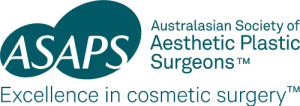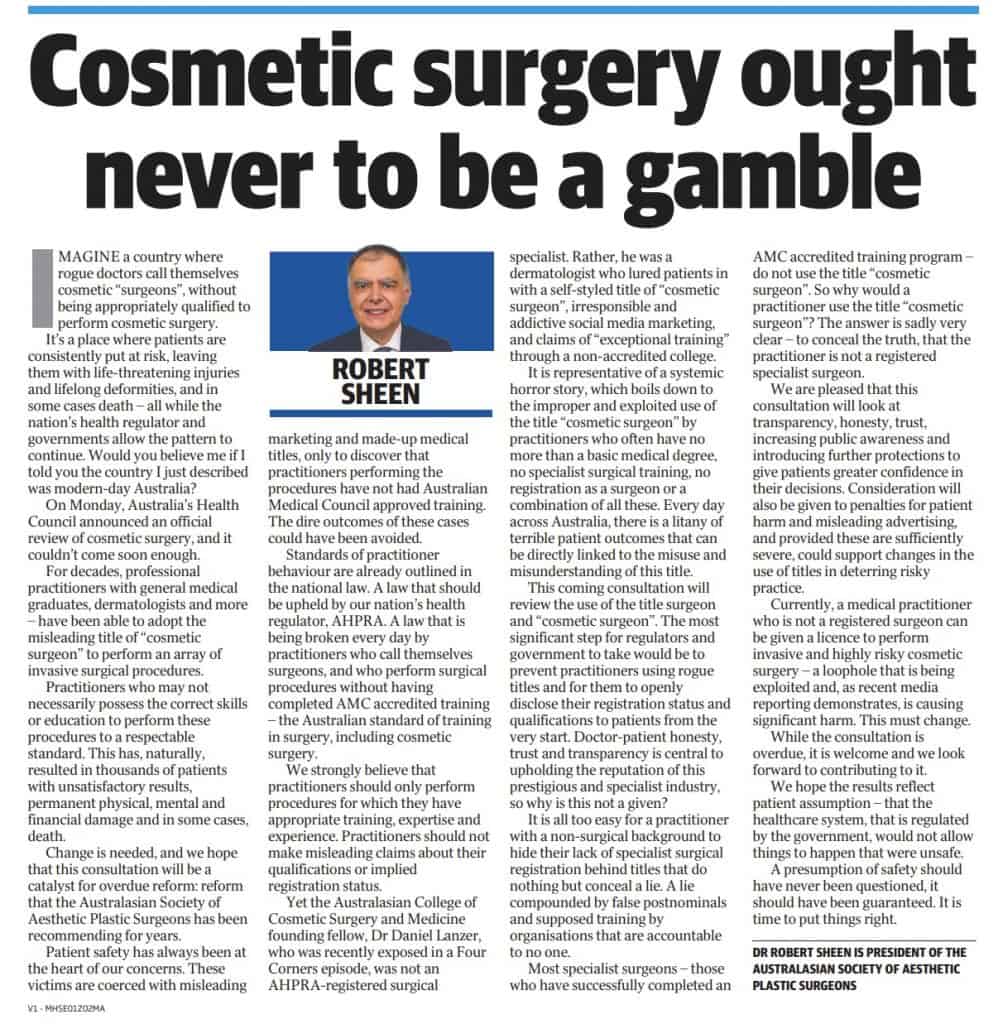By Dr Robert Sheen
IMAGINE a country where rogue doctors call themselves cosmetic “surgeons”, without being appropriately qualified to perform cosmetic surgery.
It’s a place where patients are consistently put at risk, leaving them with life-threatening injuries and lifelong deformities, and in some cases death – all while the nation’s health regulator and governments allow the pattern to continue. Would you believe me if I told you the country I just described was modern-day Australia?
On Monday, Australia’s Health Council announced an official review of cosmetic surgery, and it couldn’t come soon enough.
For decades, professional practitioners with general medical graduates, dermatologists and more – have been able to adopt the misleading title of “cosmetic surgeon” to perform an array of invasive surgical procedures.
Practitioners who may not necessarily possess the correct skills or education to perform these procedures to a respectable standard. This has, naturally, resulted in thousands of patients with unsatisfactory results, permanent physical, mental and financial damage and in some cases, death.
Change is needed, and we hope that this consultation will be a catalyst for overdue reform: reform that the Australasian Society of Aesthetic Plastic Surgeons has been recommending for years.
Patient safety has always been at the heart of our concerns. These victims are coerced with misleading marketing and made-up medical titles, only to discover that practitioners performing the procedures have not had Australian Medical Council approved training.
The dire outcomes of these cases could have been avoided.
Standards of practitioner behaviour are already outlined in the national law. A law that should be upheld by our nation’s health regulator, AHPRA. A law that is being broken every day by practitioners who call themselves surgeons, and who perform surgical procedures without having completed AMC accredited training – the Australian standard of training in surgery, including cosmetic surgery.
We strongly believe that practitioners should only perform procedures for which they have appropriate training, expertise and experience. Practitioners should not make misleading claims about their qualifications or implied registration status.
Yet the Australasian College of Cosmetic Surgery and Medicine founding fellow, Dr Daniel Lanzer, who was recently exposed in a Four Corners episode, was not an AHPRA-registered surgical specialist. Rather, he was a dermatologist who lured patients in with a self-styled title of “cosmetic surgeon”, irresponsible and addictive social media marketing, and claims of “exceptional training” through a non-accredited college.
It is representative of a systemic horror story, which boils down to the improper and exploited use of the title “cosmetic surgeon” by practitioners who often have no more than a basic medical degree, no specialist surgical training, no registration as a surgeon or a combination of all these. Every day across Australia, there is a litany of terrible patient outcomes that can be directly linked to the misuse and misunderstanding of this title.
This coming consultation will review the use of the title surgeon and “cosmetic surgeon”. The most significant step for regulators and government to take would be to prevent practitioners using rogue titles and for them to openly disclose their registration status and qualifications to patients from the very start. Doctor-patient honesty, trust and transparency is central to upholding the reputation of this prestigious and specialist industry, so why is this not a given?
It is all too easy for a practitioner with a non-surgical background to hide their lack of specialist surgical registration behind titles that do nothing but conceal a lie. A lie compounded by false postnominals and supposed training by organisations that are accountable to no one.
Most specialist surgeons – those who have successfully completed an AMC accredited training program do not use the title “cosmetic surgeon”. So why would a practitioner use the title “cosmetic surgeon”? The answer is sadly very clear – to conceal the truth, that the practitioner is not a registered specialist surgeon.
We are pleased that this consultation will look at transparency, honesty, trust, increasing public awareness and introducing further protections to give patients greater confidence in their decisions. Consideration will also be given to penalties for patient harm and misleading advertising, and provided these are sufficiently severe, could support changes in the use of titles in deterring risky practice.
Currently, a medical practitioner who is not a registered surgeon can be given a licence to perform invasive and highly risky cosmetic surgery – a loophole that is being exploited and, as recent media reporting demonstrates, is causing significant harm. This must change.
While the consultation is overdue, it is welcome and we look forward to contributing to it.
We hope the results reflect patient assumption – that the healthcare system, that is regulated by the government, would not allow things to happen that were unsafe.
A presumption of safety should have never been questioned, it should have been guaranteed. It is time to put things right.

